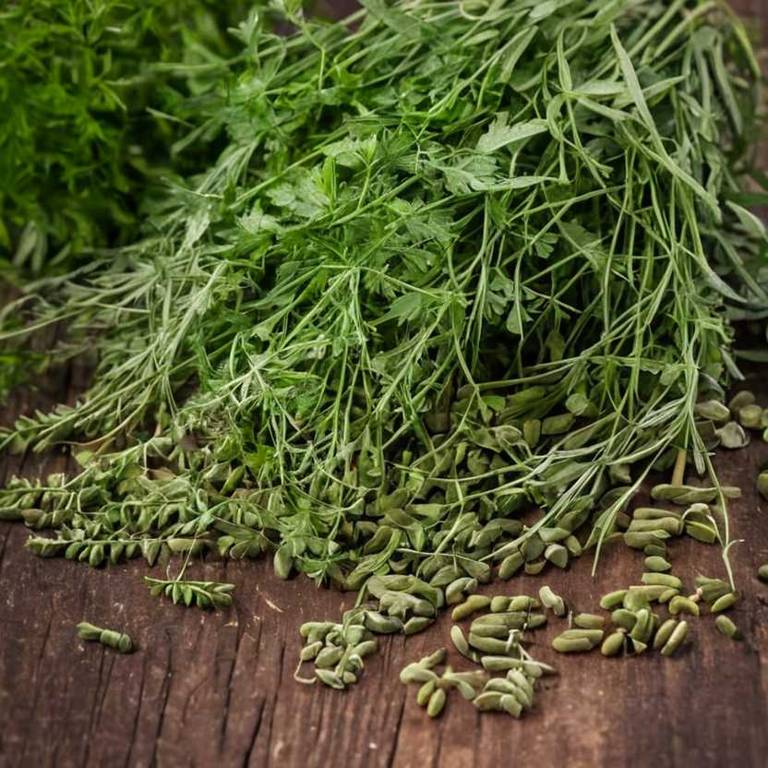By Leen Randell
Updated: Jul 06, 2024
10 Health Benefits Of Coriandrum Sativum (Coriander)

Coriandrum sativum, also known as coriander, has health benefits such as reducing nausea and digestive issues, due to its anti-inflammatory and carminative properties.
The volatile oils present in coriander seeds, including limonene and linalool, have been shown to alleviate symptoms of IBS, bloating, and gas.
These benefits can improve people's lives by providing relief from uncomfortable digestive symptoms, allowing them to enjoy daily activities with greater ease and confidence.
This article explains in details the 10 best health benefits of Coriandrum sativum.
1. Reduces anxiety
Coriandrum sativum reduces anxiety because it contains a compound called linalool, which has a calming effect on the nervous system.
This herb has been traditionally used in herbal medicine to treat anxiety-related disorders, and modern research has confirmed its anxiolytic properties.
When consumed, coriander helps regulate cortisol levels, promoting a sense of relaxation and reducing feelings of stress and worry, making it a natural remedy for managing anxiety.
2. Fights inflammation
Coriandrum sativum fights inflammation because of its potent antioxidant and anti-inflammatory compounds.
The plant's essential oils, including linalool and geraniol, have been shown to inhibit the production of pro-inflammatory cytokines, reducing swelling and pain.
Additionally, coriander's flavonoids and phenolic acids have antioxidant properties that help neutralize free radicals, further combating inflammation and promoting overall health and well-being.
3. Lowers cholesterol
Coriandrum sativum lowers cholesterol because of its unique combination of bioactive compounds.
The oil extracted from coriander seeds contains flavonoids and phenolic acids that have been shown to inhibit the absorption of dietary cholesterol in the gut, thereby reducing serum cholesterol levels.
Additionally, coriander's fiber content helps to bind to bile salts, which are then eliminated from the body, further contributing to a reduction in low-density lipoprotein (LDL) cholesterol.
4. Prevents urinary tract infections
Coriandrum sativum prevents urinary tract infections because of its antimicrobial and anti-inflammatory properties.
The essential oil extracted from coriander seeds has been shown to inhibit the growth of bacteria that cause UTIs, such as E. coli. Additionally, coriander's antioxidants help reduce inflammation in the urinary tract, preventing bacterial adhesion and subsequent infection.
As a natural remedy, coriander may offer a safe and effective alternative to traditional treatments for UTIs.
5. Improves sleep
Coriandrum sativum improves sleep because of its unique combination of active compounds.
The essential oil extracted from coriander seeds contains linalool and geraniol, which have a calming effect on the body, promoting relaxation and reducing anxiety.
Additionally, coriander's flavonoids and phenolic acids exhibit antioxidant properties that help to regulate the body's sleep-wake cycle, leading to improved quality of sleep and reduced insomnia symptoms.
6. Aids in digestion
Coriandrum sativum aids in digestion because of its unique blend of bioactive compounds.
The essential oil contained in coriander seeds has been shown to relax the muscles in the digestive tract, reducing symptoms of indigestion and bloating.
Additionally, coriander's carminative properties help to eliminate gas and prevent the formation of new gas pockets, further alleviating discomfort associated with digestion.
7. Protects against food poisoning
Coriandrum sativum protects against food poisoning because of its unique bioactive compounds.
The plant's essential oils, including linalool and geraniol, have been shown to inhibit the growth of harmful bacteria such as E. coli, Salmonella, and Campylobacter, which are common causes of foodborne illnesses.
Additionally, coriander's antioxidants and anti-inflammatory properties may help reduce oxidative stress and inflammation in the gut, further enhancing its protective effects against food poisoning.
8. Reduces blood pressure
Coriandrum sativum reduces blood pressure because of its unique combination of flavonoids and terpenes.
These compounds have been shown to possess vasodilatory properties, which help relax blood vessels and improve blood flow.
Additionally, coriander's antioxidant properties help reduce oxidative stress and inflammation in the body, both of which are known contributors to hypertension.
9. Supports bone health
Coriandrum sativum supports bone health because of its rich antioxidant and anti-inflammatory properties.
The essential oils present in coriander, particularly linalool and borneol, have been shown to reduce oxidative stress and inflammation, which are major contributors to osteoporosis and bone degradation. Additionally, coriander contains calcium, magnesium, and phosphorus, essential minerals that help maintain strong bones and prevent fractures.
By incorporating coriander into one's diet, individuals can potentially mitigate the risk of bone-related diseases and promote overall skeletal health.
10. Boosts immunity
Coriandrum sativum boosts immunity because of its rich content of antioxidants, vitamins, and minerals.
The seeds contain a unique compound called linalool, which has antimicrobial properties that help fight off infections and reduce inflammation in the body.
Additionally, coriander's high levels of vitamin C and E, along with its flavonoids, further enhance its immunomodulatory effects, making it an excellent natural remedy to support overall health and well-being.